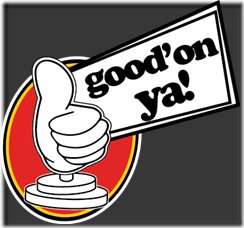In Australia people usually speak British English, but Australians have many unique words and phrases that they use, and I thought that we could look at a few of them in today`s blog.
オーストラリアでは人々は大抵イギリス英語を話します。 でもイギリスでは使われない彼ら独自のユニークな単語、表現、フレーズがたくさんあります。
今回はそれらを少し紹介したいと思います。

I lived in Sydney, Australia for two years. They were years filled with good memories and deep experiences. On the first day I arrived in Sydney (after a looooong flight from Vancouver) I saw a flock of cockatoos fly through our neighborhood, and I knew I had found a magical place. Sydney is also where I met my wife, so it is a special place for our family.
僕はかつてオーストラリアに二年住んだことがあります。素晴らしい思い出と意義深い経験がたくさん詰まった忘れられない二年間です。(バンクーバー(カナダ)からの気が遠くなるほど長いフライトを経て)シドニーについた初日、カカトゥー(白いオウム)の群れが飛びまわっているのを見て、何という魅力あふれた素晴らしい街に自分は降り立ったのだろうと胸が高鳴ったのを覚えています。
妻とであった町でもあるし、僕たち家族にとって大切な場所なのです。
Ta
Ta is a way that Australians say thank you. In general, Australians are very laid back people, and this phrase is usually said a little slower than most spoken English. Ta is usually used in informal situations, so I think it is similar to どうも, except that I have heard Australians use ta in formal situations as well.
これはオーストラリア英語でthank you ―ありがとうの意味です。
オーストラリアの人々は全体として非常にリラックスしていて些細なことは気にしない気楽な人々が多いように思います。
そしてこのTaは普通に話すときよりも少しスピードを落として言います。 フォーマルな会話では使わず、気軽な会話の中でカジュアルに使う表現です。僕は日本語だと「どうも」が近いかなと思います。ただ、日本人はフォーマルな会話で「どうも」は使いませんが、オーストラリア人がフォーマルな会話でも「Ta」を使っているのを何度も聞いたことがあります。
Good on ya!
Good on ya! Is a very common phrase in Australia. It`s meaning is similar to “well done” or “nice work.” The “ya” part of this phase is generally how Australians say “you.”
非常に良く使われる表現です。「well done」「nice work」などと似た意味です。よくできました、すごいですね。などという意味ですね。
yaはyouです。オーストラリアではこのyou をyaと発音することがとても多いです。
(カタカナで発音を書くと「グドオンニャ」という感じです。知らないと何を言っているのかさっぱり意味不明です。でも良い意味なので言われたら相手に微笑み返しましょう。)
Grog
In North American English we use the slang word “booze” to talk about alcohol (of any kind). Australian English uses the slang word grog for this situation.
アメリカ英語のスラングでアルコールのことを「booze」と言いますがオーストラリアではスラングで「grog」と言います。
Cuppa
I`ve always thought that this is one of the most endearing words that Australians use. If you hear it in Australia it might come in question form: “Would you like a cuppa?” Here the meaning is “Would you like a cup of (whatever hot drink you like—coffee, tea, etc.)?” Sharing a cuppa is an important ritual in Australia.
この「カッパ」という言葉がオーストラリア人が使う言葉で一番愛嬌があって可愛らしいものだと僕は思います。 オーストラリアでこの言葉を聞くときは質問の中に含まれていることが多いかもしれません。
“Would you like a cuppa?”
これはwould you like~?~したいですか? Cuppa-cup of tea(紅茶をいかがですか?) という意味です。必ずしも紅茶ではなくても何かお飲物をいかがですか?という意味です。
お茶の席を共にするのはオーストラリアではとても重要です。
(訳者はオーストラリアに住み始めた当時もちろんこのcuppaという表現を知らなかったため(他の基本的な英語表現もほとんど知りませんでしたが)「Do you wanna go for a cuppa?」お茶を飲みに行かない?と誘われていることがずっとわからず、「ゴーフォーカッパ?カッパってなに?カッパを見に行くのか?そんなわけないか。」 と数日頭を悩ませた記憶があります。(←痛々しい))
Mate
If you`ve seen a movie about Australia you`ve probably heard one of the characters say “G`Day mate.” This is a very clichéd Australian greeting similar to こんにちは. However, when mate is used on its own the meaning changes to “friend.” For example: “Her mate from school likes to go hiking.”
もしあなたがオーストラリア映画を見たことがあるならば、きっと登場人物が“G`Day mate.”と言っているのを聞いたことがあると思います。
これは「こんにちは」ですが、オーストラリア英語の代表のように思われている表現です。
Mateがそれ単独で使われているときはfriendという意味になります。例えば “Her mate from school likes to go hiking.”
彼女の学校の友達はハイキングが好きなんだって。 という意味になります。
I remember reading an article in an Australian magazine that talked about the importance of “mateship” (friendship).
Australia is a wonderful place to go and practice your English. When you`re there don`t forget to find a nice place to share a cuppa with your mate.
オーストラリアの雑誌の記事で「Mateship-friendship-友情の大切さ」について書かれた記事を読んだことを思い出します。
オーストラリアは英語を学ぶのに素晴らしい場所です。
おさらい
あなたがオーストラリアに行った時のために本日のおさらいです。
次の英文を訳してみましょう。
When you`re there don`t forget to find a nice place to share a cuppa with your mate.
訳者はこう訳しました。
「オーストラリアに行ったら、友達とお茶する素敵な場所を探すのを忘れずに!」
それでは今日はこの辺でSee you next time!